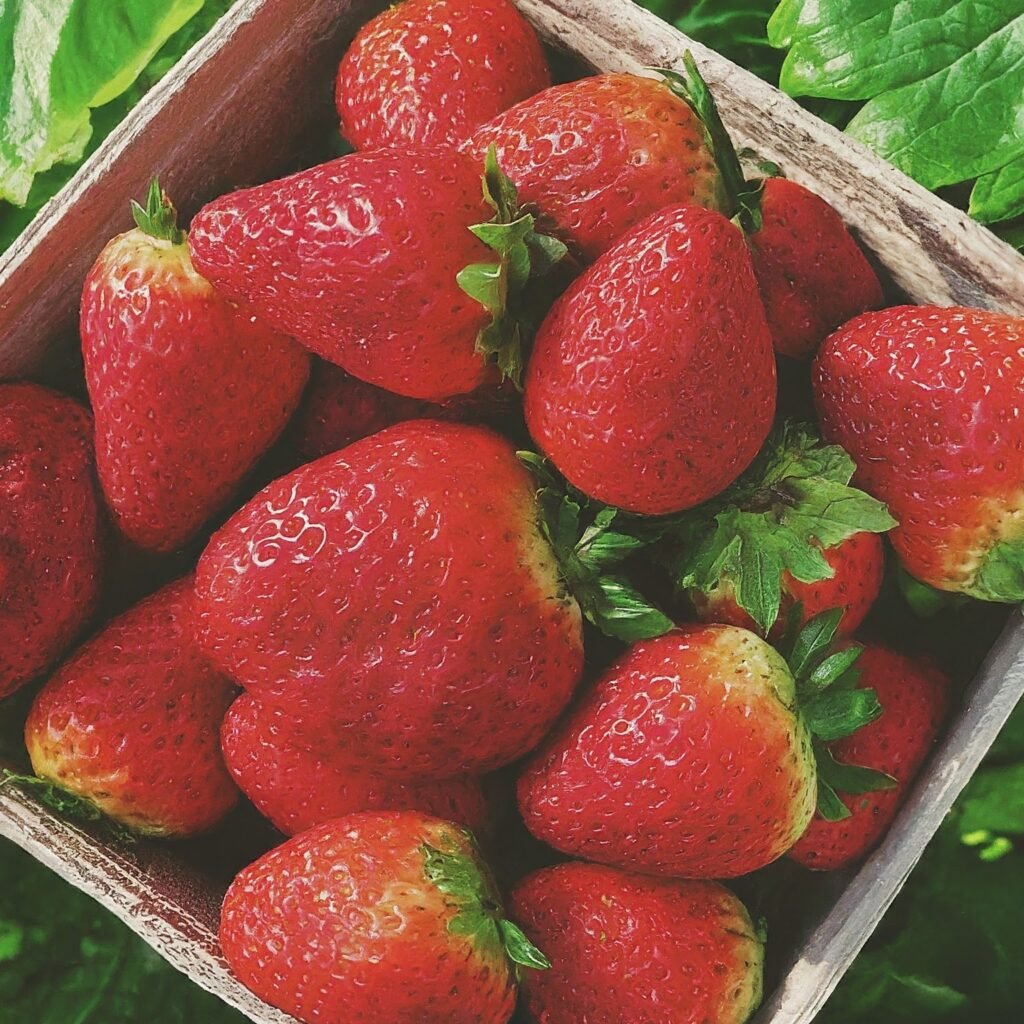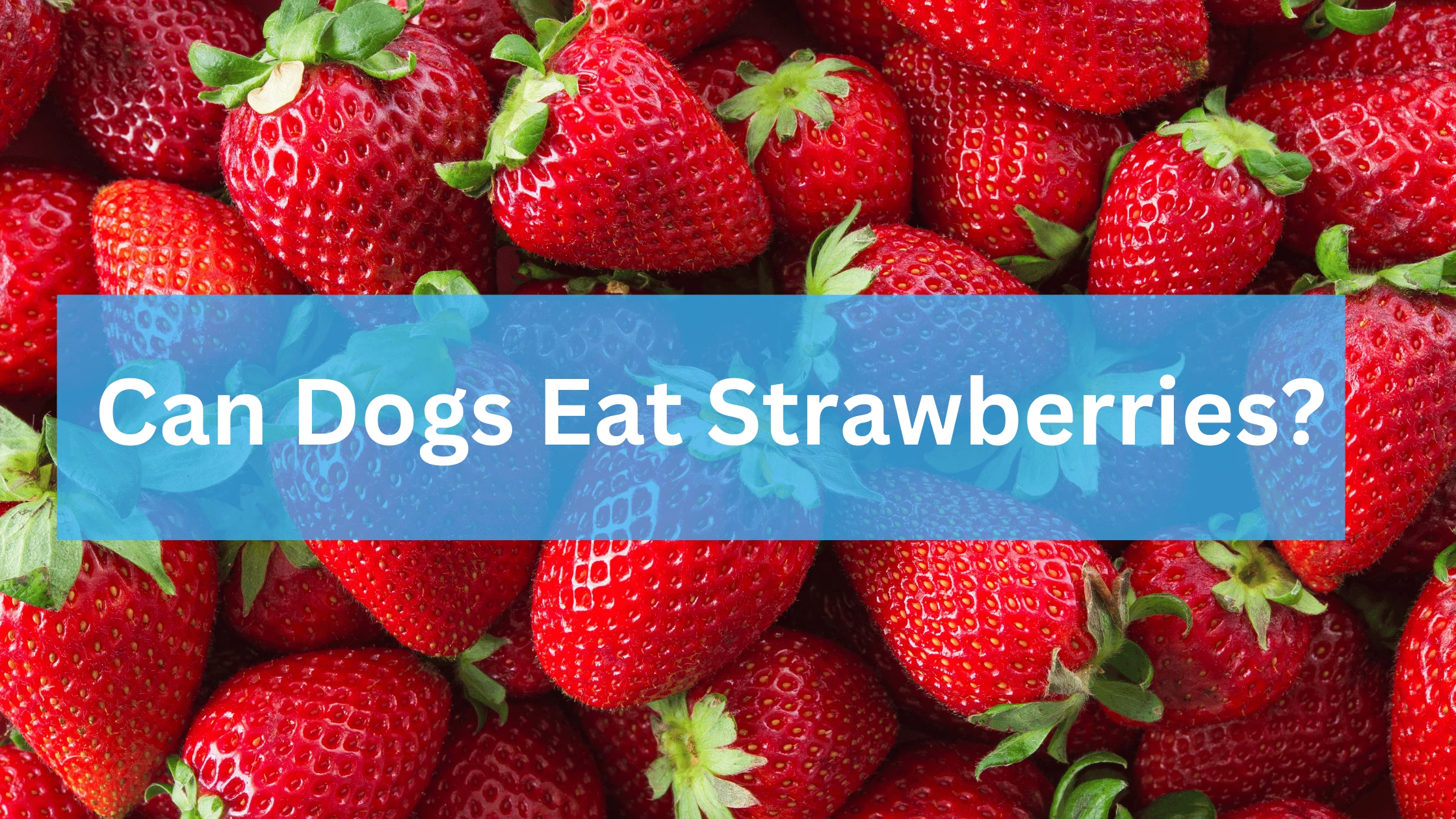Strawberries are a delightful summer treat cherished by many, but as a dog owner, you may wonder: Can Dogs Eat Strawberries?
With an abundance of information available, navigating through the dos and don’ts can be overwhelming.
That’s why we’re here to provide a comprehensive guide, addressing the safety and benefits of feeding strawberries to your furry companions.
Can Dogs Eat Strawberries? Understanding the Safety

Strawberries are considered non-toxic for dogs, making them a safe option for occasional treats. However, it’s crucial to address concerns regarding various forms of strawberries.
While fresh strawberries pose no harm, canned, frozen, or dried varieties may contain additives or preservatives that could be detrimental to your dog’s health.
As with any treat, moderation is key. While strawberries offer numerous benefits, excessive consumption can lead to digestive issues or weight gain in dogs.
Therefore, it’s vital to offer strawberries in moderation, ensuring they remain a safe and enjoyable addition to your dog’s diet.
Benefits of Strawberries for Dogs
Beyond their delectable taste, strawberries pack a nutritional punch for our canine companions.
Rich in antioxidants, vitamins, and minerals, strawberries contribute to overall health and well-being.
Additionally, strawberries contain teeth-whitening enzymes, promoting oral hygiene and a dazzling smile in your furry friend.
With immune-boosting properties, strawberries serve as a natural defense against illnesses, enhancing your dog’s vitality.
However, it’s important to remember that strawberries should be viewed as an occasional treat rather than a staple in your dog’s diet.
Moderation ensures your dog reaps the benefits of strawberries without the risk of overindulgence.
In conclusion, understanding the safety and benefits of strawberries for dogs is essential for responsible pet ownership.
By incorporating strawberries into your dog’s diet mindfully, you can provide them with a nutritious and enjoyable treat while safeguarding their well-being.
Always consult with your veterinarian to ensure strawberries align with your dog’s individual dietary needs and health considerations.
With moderation and mindfulness, you can treat your furry companion to the joys of strawberries while promoting their overall health and happiness.
Risks Associated with Feeding Strawberries to Dogs
Feeding strawberries to your furry friend can indeed have its risks, particularly when not done in moderation.
One primary concern is the high sugar content found in these juicy berries. While the natural sugars in strawberries may seem harmless, they can pose significant issues for diabetic or overweight dogs.
Excessive sugar intake can lead to spikes in blood glucose levels, exacerbating existing health conditions and potentially causing further complications.
Additionally, the fiber content in strawberries, while beneficial in controlled amounts, can lead to digestive issues if consumed in excess.
Some dogs may experience gastrointestinal discomfort, including diarrhea or stomach upset, when overindulging in strawberries.
Monitoring your dog’s response to strawberries is crucial, especially when introducing them for the first time or offering them in larger quantities.
Pay close attention to any changes in your dog’s behavior or bowel movements, and adjust their strawberry intake accordingly.
Safely Incorporating Strawberries into Your Dog’s Diet
To ensure your dog enjoys strawberries safely, it’s essential to follow proper preparation methods.
Start by thoroughly washing the strawberries to remove any dirt or pesticides that may be present on the surface.
Next, carefully remove the stems and leaves, as these parts can pose a choking hazard and may be difficult for your dog to digest.
Once cleaned and trimmed, consider different ways to serve strawberries to cater to your dog’s preferences.
You can slice the strawberries into small, bite-sized pieces for easy consumption, or puree them for a smoother texture.
For a refreshing treat during the warmer months, try freezing sliced strawberries and offering them as a chilled snack.
However, before incorporating strawberries into your dog’s diet, it’s crucial to consult with your veterinarian, especially if your dog has underlying health conditions.
Your vet can provide personalized guidance based on your dog’s individual needs and ensure that strawberries are a suitable addition to their diet.
By taking these precautions and introducing strawberries responsibly, you can provide your dog with a tasty and nutritious treat while prioritizing their health and well-being.
Delicious Strawberry Dog Treat Recipes

Looking to spoil your furry friend with homemade delights? We’ve got you covered with these irresistible strawberry-infused dog treat recipes:
- Frozen Strawberry Popsicles:
- Ingredients: Fresh strawberries, plain yogurt
- Method: Puree fresh strawberries and mix with plain yogurt. Pour into ice cube trays or popsicle molds and freeze until solid. Serve as a refreshing summer treat.
- Strawberry Banana Bites:
- Ingredients: Fresh strawberries, ripe bananas, oat flour
- Method: Mash ripe bananas and finely chop fresh strawberries. Mix with oat flour to form a dough. Roll into small balls and bake until golden brown. Let cool before serving.
- Strawberry Oatmeal Cookies:
- Ingredients: Fresh strawberries, oats, peanut butter
- Method: Blend fresh strawberries into a puree. Mix with oats and peanut butter to form a dough. Shape into cookies and bake until firm. Allow to cool before treating your pup.
- Strawberry Coconut Bark:
- Ingredients: Fresh strawberries, shredded coconut, coconut oil
- Method: Melt coconut oil and mix with shredded coconut. Spread onto a baking sheet and top with sliced strawberries. Freeze until solid, then break into pieces for a delicious snack.
These homemade treats are sure to delight your dog’s taste buds while providing the nutritional benefits of fresh strawberries. Get creative in the kitchen and tailor these recipes to suit your dog’s preferences and dietary needs.
Exploring Alternatives: Other Fruits for Dogs
While strawberries are a fantastic treat option for dogs, there’s a world of fruit varieties to explore. Consider incorporating these dog-friendly fruits into your furry friend’s diet:
- Blueberries: Packed with antioxidants and low in calories, blueberries make a tasty and nutritious snack for dogs. They can be served fresh or frozen for a refreshing treat.
- Apples: Rich in vitamins and fiber, apples are a crunchy and satisfying snack for dogs. Just be sure to remove the seeds and core before offering them to your pup.
- Watermelon: With its high water content, watermelon is a hydrating and refreshing option for dogs, particularly on hot days. Remove the seeds and rind, then cut into bite-sized pieces for easy consumption.
- Bananas: Full of potassium and vitamins, bananas are a naturally sweet treat that dogs love. Mash them up and serve as a standalone snack or mix into homemade treats for added flavor.
- Pineapple: Packed with vitamins and enzymes, pineapple offers numerous health benefits for dogs. Serve fresh or frozen for a tropical twist on snack time.
By incorporating a variety of fruits into your dog’s diet, you can provide them with a diverse range of nutrients and flavors while keeping their taste buds satisfied. Just be sure to introduce new fruits gradually and monitor your dog’s response for any signs of sensitivity or allergies.
FAQs About Dogs and Strawberries
Curious about feeding strawberries to your furry companion? Here are some frequently asked questions, answered:
Are strawberries safe for dogs to eat?
Yes, strawberries are generally safe for dogs to eat. They are non-toxic and offer various health benefits when consumed in moderation.
Can dogs eat strawberry leaves?
While strawberry leaves are not toxic to dogs, consuming them in large quantities may cause an upset stomach. It’s best to remove the leaves before offering strawberries to your dog.
Can dogs eat canned strawberries?
Canned strawberries often contain added sugars and preservatives, making them less suitable for dogs. It’s best to opt for fresh or frozen strawberries without any added ingredients.
What should I do if my dog eats too many strawberries?
If your dog consumes too many strawberries, monitor them for any signs of digestive upset, such as diarrhea or vomiting. Offer plenty of water and consult your veterinarian if symptoms persist or worsen.
Can dogs eat strawberry tops?
While strawberry tops are not toxic, they may pose a choking hazard and are difficult for dogs to digest. It’s recommended to remove the tops before offering strawberries to your dog.
Can Dogs Eat Strawberry Uncrustables?
While plain strawberries are safe, it’s best to avoid processed foods like Uncrustables, which may contain added sugars and preservatives.
Are Strawberries Dangerous to Dogs?
Strawberries are not inherently dangerous to dogs, but overfeeding can lead to digestive issues.
Can Dogs Have Frozen Strawberries?
Frozen strawberries can be a refreshing treat for dogs, but be mindful of portion sizes and potential choking hazards.
Can Dogs Eat Dried Strawberries?
Dried strawberries may contain added sugars and sulfites, which can be harmful to dogs. It’s best to stick to fresh or frozen strawberries.
Can Dogs Eat Dehumidifier Strawberries?
Dehumidifier strawberries are not safe for dogs, as they may contain harmful chemicals or mold from the dehumidification process.
Conclusion:
In conclusion, strawberries can be a tasty and nutritious treat for your canine companion when offered responsibly.
By understanding the safety, benefits, and potential risks associated with feeding strawberries to dogs, you can make informed decisions about incorporating them into your dog’s diet.
Remember to practice moderation and monitor your dog’s response when introducing new foods, including strawberries.
Additionally, exploring a variety of nutritious treats and foods can provide your dog with a well-rounded diet and keep their taste buds satisfied.
As always, consulting a veterinarian is essential for personalized advice and guidance tailored to your individual dog’s needs.
Your vet can help you navigate any dietary concerns or health considerations, ensuring that your furry friend stays happy, healthy, and well-fed.
Also Read : Can Dogs Eat Minted Lamb? Best Guide.
Also Read : Why Is My Dog Licking the Floor? Insights from a Dog Expert







